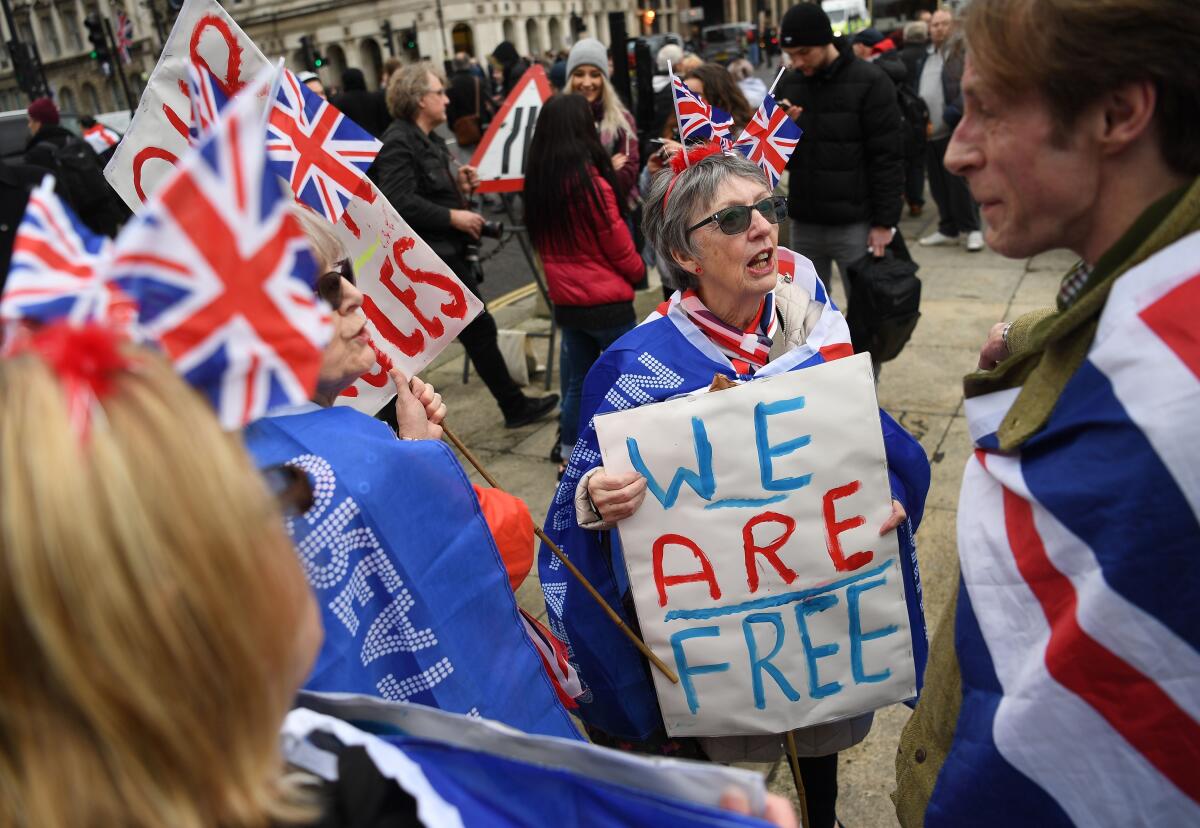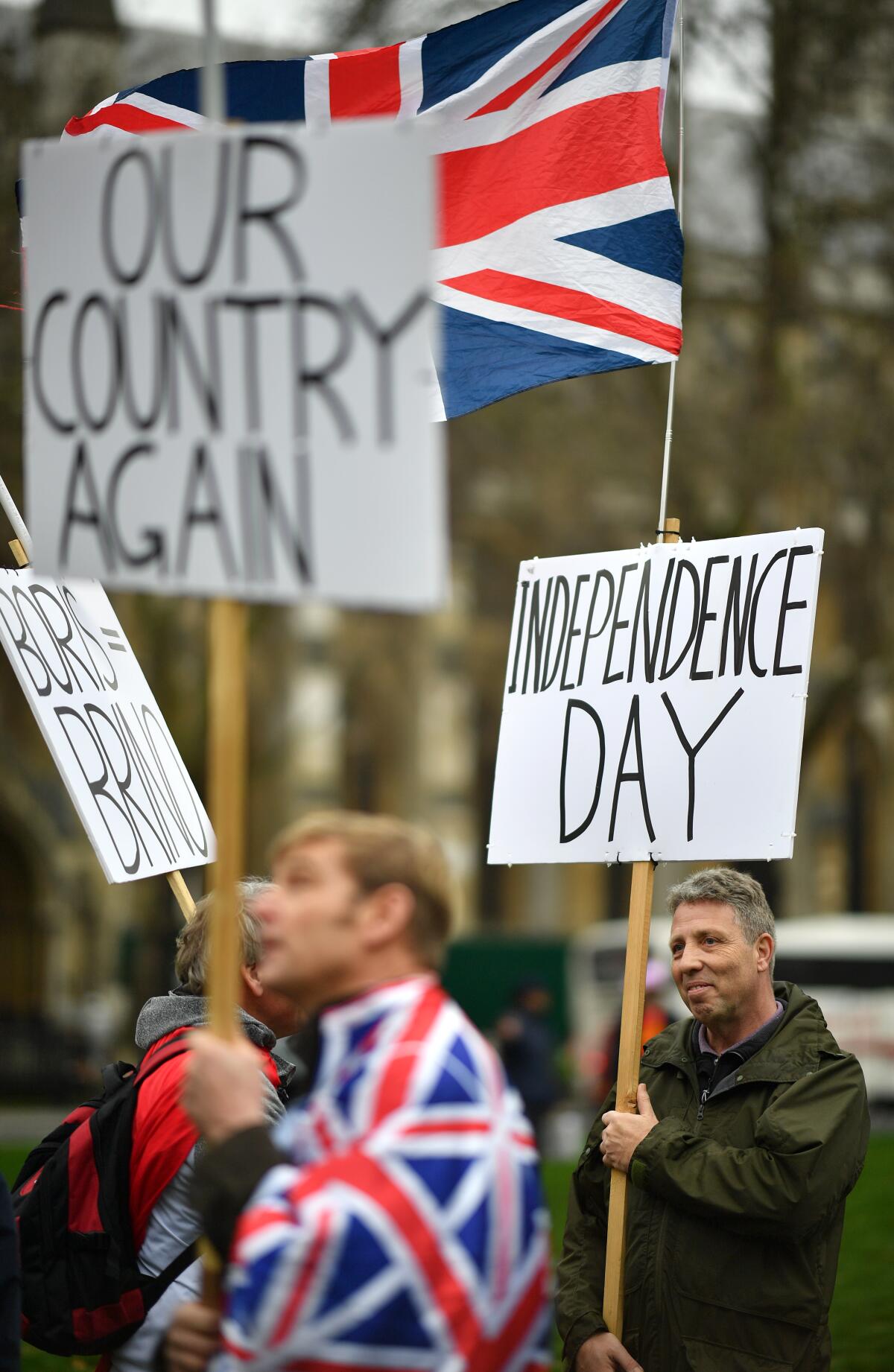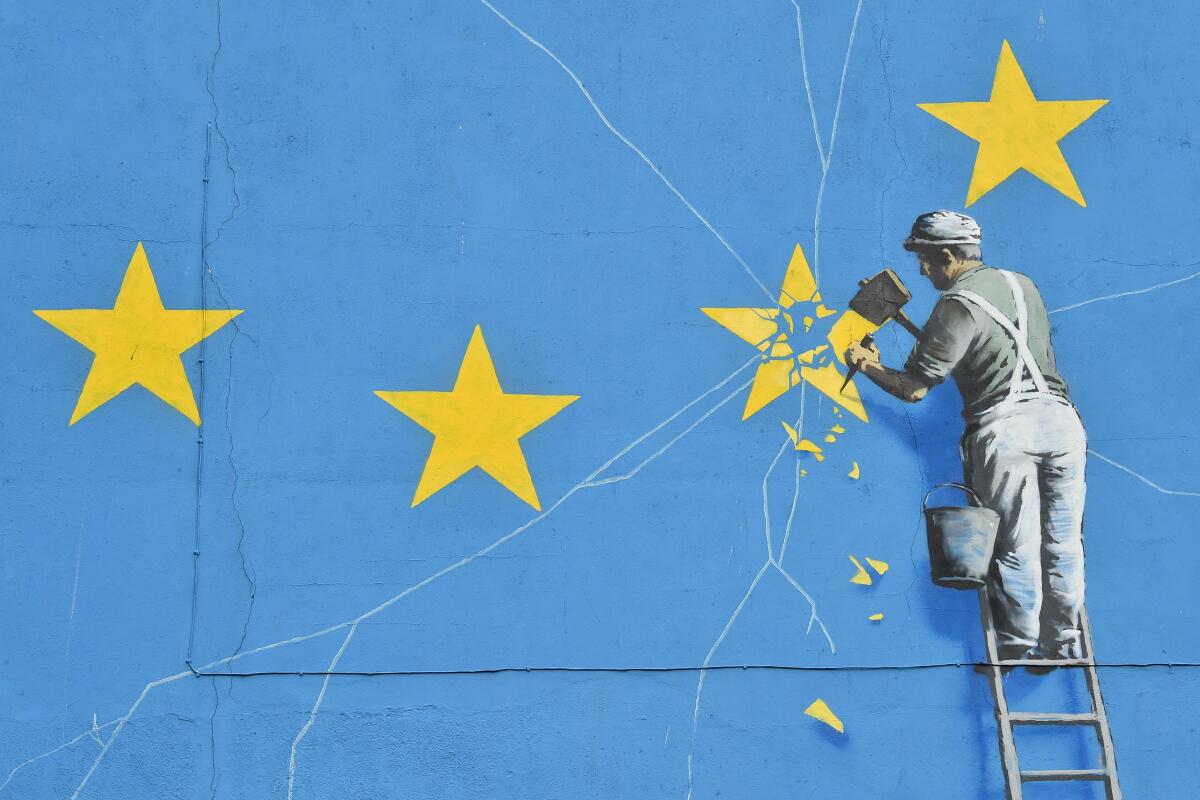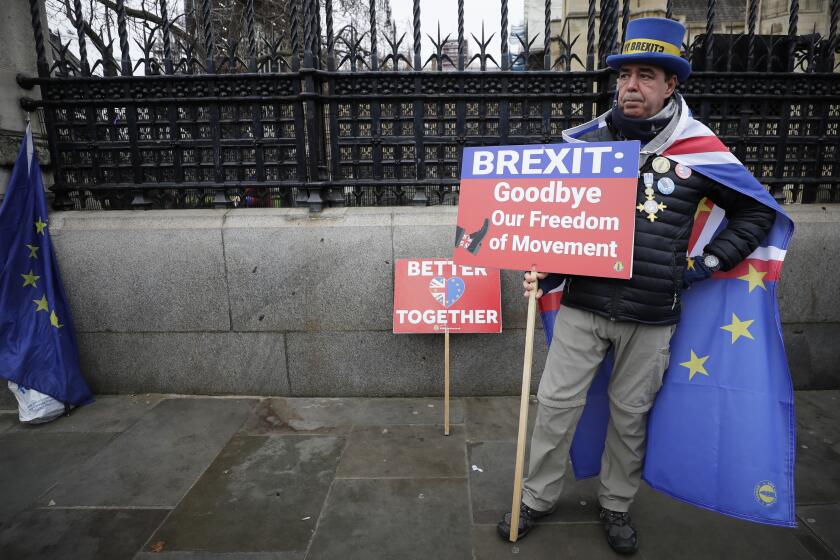Britain leaves the European Union, leaping into the unknown

- Share via
LONDON — So long, farewell, auf wiedersehen, adieu.
With little fuss and not much fanfare, Britain left the European Union on Friday after 47 years of membership, taking a leap into the unknown in a historic blow to the bloc.
The United Kingdom’s departure became official at 11 p.m. local time, midnight in Brussels, where the EU is headquartered. Thousands of enthusiastic Brexit supporters gathered outside Parliament in London cheered as the hour struck. They had been hoping for this moment since Britain’s 52%-to-48% vote in June 2016 to walk away from the club it had joined in 1973.
Prime Minister Boris Johnson called Britain’s departure “a moment of real national renewal and change.”
Britons counted down the hours Friday to their country’s departure from the European Union — some joyous, some sad, many just hopeful the divorce would mark the end of an anguished chapter in their country’s history.
Whether Brexit makes Britain a proud nation that has reclaimed its sovereignty, or a diminished presence in Europe and the world, will be debated for years to come.
The now 27-member EU will have to bounce back from one of its biggest setbacks in its 62-year history to confront an ever more complicated world as its former member becomes a competitor, just across the English Channel.
Mr. Stop Brexit may have failed in his main goal, but he’s not giving up
While Britain’s exit is a historic moment, it only marks the end of the first stage of the Brexit saga. When Britons wake up Saturday, they will notice very little change. The U.K. and the EU have given themselves an 11-month “transition period” — in which the U.K. will continue to follow the bloc’s rules — to strike new agreements on trade, security and a host of other areas.
French President Emmanuel Macron called Brexit a “historic alarm signal” that should force the EU to improve itself.
“It’s a sad day, let’s not hide it,” he said in a televised address. “But it is a day that must also lead us to do things differently.”
Inside the European Council headquarters in Brussels, Britain’s flag was quietly removed from the group of member flags, a moment that was not observed by any of the bloc’s leaders. An official simply folded it and walked away.
The EU flag and Union Jack were also lowered outside Britain’s EU office. Starting Saturday, it will become an embassy, with just the British flag flying.

It’s the first time a country has left the EU, and many in the bloc rued the day. In Brussels, European Commission President Ursula von der Leyen lamented that “as the sun rises tomorrow, a new chapter for our union of 27 will start.”
But she warned that Brexit day would mark a major loss for the U.K. and said the island nation was heading for a lonelier existence.
“Strength does not lie in splendid isolation, but in our unique union,” she said. Newspapers across the continent were marking the departure with headlines of “Adieu to Europe” and “Bye-Bye!” next to a Union Jack flag.
Johnson held a Cabinet meeting, symbolically, in the pro-Brexit town of Sunderland in northeast England, rather than in London.
In a break with usual practice, independent media outlets were not allowed to film Johnson’s speech that was broadcast an hour before Britain’s exit, which the government recorded Thursday at 10 Downing St.

The government was marking Brexit in what it intended to be a dignified, non-triumphalist fashion, with red, white and blue lights illuminating government buildings and a countdown clock projected onto the prime minister’s Downing Street residence.
Some Brexit supporters will be holding more raucous celebrations. Arch-Brexiteer Nigel Farage and his band of devotees will gather for patriotic songs and speeches in London’s Parliament Square to mark a moment that even Farage sometimes doubted would ever come.
Others do not feel like indulging in any festivities.
“Many of us want to just mark our sadness in public,” said Ann Jones, who joined dozens of other Brexit opponents on a march to the EU’s mission in London. “And we don’t want trouble, we just want to say, well, you know, we didn’t want this.”
Negotiations between Britain and the EU on trade, security and more are due to start in March, and the early signs are not encouraging. The EU says Britain can’t have full access to the EU’s single market unless it follows the bloc’s rules, but Britain insists it will not agree to follow an EU rule book in return for unfettered trade.
“We want trade to be as frictionless as possible, but the EU is clear, you can only have fully frictionless trade if you accept all of their rules, if you accept all their laws,” said Cabinet minister Michael Gove. “We voted to be independent.”
Britain was never a wholehearted EU member, but actually leaving the bloc was long considered a fringe idea. It gradually gained strength within the Conservative Party, which has a wing of fierce “euroskeptics” — opponents of EU membership. Then-Prime Minister David Cameron eventually agreed to hold a referendum, saying he wanted to settle the issue once and for all.
It hasn’t worked out that way. Since the 2016 vote, the U.K. has held fractious negotiations with the EU that finally, late last year, secured a deal on divorce terms. But Britain is leaving the bloc arguably as divided as it was on referendum day.
By and large, Britain’s big cities voted to stay in the EU, while small towns voted to leave. England and Wales backed Brexit, while Northern Ireland and Scotland voted to remain.
Candlelit vigils were being held in several Scottish cities, and the EU flag will not be lowered outside the Scottish Parliament on Friday night.
Lawmakers there voted to keep it as a symbol of their opposition to Brexit. Scotland’s pro-EU government will also light up two government buildings in the blue and yellow of the EU flag.
Scottish First Minister Nicola Sturgeon said Brexit “will be a moment of profound sadness for many of us across the U.K.”
“And here in Scotland, given that it is happening against the will of the vast majority of us, that sadness will be tinged with anger,” she said in a speech in Edinburgh.
Sturgeon’s Scottish National Party government is demanding the right to hold a referendum on independence from the U.K., something Johnson refuses to grant.
London, which is home to more than 1 million EU citizens, also voted by a wide margin to stay in the bloc. Mayor Sadiq Khan said he was “heartbroken” about Brexit.
“We should be really proud that we as a city voted overwhelmingly to remain,” Khan, who has linked the Brexit vote to a rise in xenophobic abuse, told the Associated Press. “We should be really proud that we are a city that welcomes people who are different. The color of your skin, the color of your flag, the color of your passport has no different implications. We welcome you to our city.”
In the English port of Dover, just 20 miles across the channel from France, retiree Philip Barry welcomed the new era.
“My expectation is that there may be a little bump or two in the road, but in the end, it will even out,” he said. “Somebody once said: short-term pain but long-term gain.”
More to Read
Sign up for Essential California
The most important California stories and recommendations in your inbox every morning.
You may occasionally receive promotional content from the Los Angeles Times.











